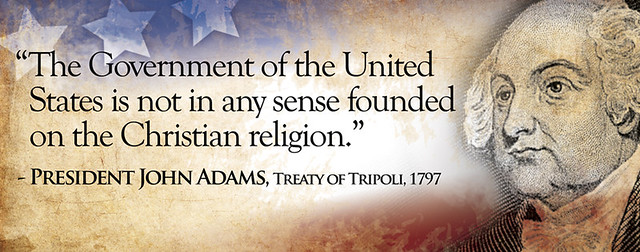
Jefferson's Advocacy For Protection Of Jew, Gentile, Mahometan, Hindu And "Infidel"
Dear J,
The separation of church and
state was not specified in the constitution because it was presupposed.
To specify church-state
separation would be like making a "supply list" and including
"breathable air."
The American
"experiment" began when religious refugees fled England because The Church of England and The
Royal Family were
co-terminous: one sectarian religion and one autocratic government fused in a
single identity.
With a depth of passion now
hard to imagine, The Founding
Fathers sought to avoid any
behavior that hinted at Church/State merger.
What the Constitution
specifies is this: "Congress shall make no law respecting an establishment
of religion, or prohibiting the free exercise thereof; or abridging the freedom
of speech..." http://en.
Note the opening phrase:
"Congress shall make no law respecting an establishment of religion."
"An establishment of
religion" harkens back to the establishment of one - and only one -
religion in England.
In the Founders' view, all
religions -- all belief systems including those of "infidels" -- are
on equal constitutional footing.
If we adhere to the
constitution's "original intent" (so cherished by Antonin Scalia) we
can grant equal time (in public
space) to all Christian sects as well as to Hinduism, Buddhism, Judaism,
Islam, Shinto, Taoism, Animism, Pantheism, Jainism (an atheistic religion),
Mormonism (a non-Christian religion) and probably to atheism itself. (See Romney,
Mormonism and Christianity: http://paxonbothhouses.blogspot.com/2012/04/romney-mormonism-and-christianity.html)
I think the former is
preferable. I can settle for the latter.
Consider the following
passage by Thomas Jefferson, the single most influential voice in the creation
of the Constitution.
Thomas Jefferson,
Autobiography
1821 Works
1:71
"The
bill for establishing religious freedom, the principles of which had, to a
certain degree, been enacted before, I had drawn in all the latitude of reason
and right. It still met with opposition; but, with some mutilations in the
preamble, it was finally passed; and a singular proposition proved that its
protection of opinion was meant to be universal. Where the preamble declares,
that coercion is a departure from the plan of the holy author of our religion,
an amendment was proposed, by inserting the word "Jesus Christ," so
that it should read, "a departure from the plan of Jesus Christ, the holy
author of our religion;" the insertion was rejected by a great majority,
in proof that they meant to comprehend, within the mantle of its protection,
the Jew and the Gentile, the Christian and Mahometan, the Hindoo, and Infidel
of every denomination." (For more insight into Jefferson's
relationship with Islam, see http://www.slate.com/
Jefferson's religious
latitudinarianism was common among the
founders - "a great
majority" as Jefferson categorized them.
America is a better place for
such breadth of tolerance.
Share this post with
conservative friends and see what they think - not in terms of sentiment and
tradition, but in terms of constitutional principles.
Pax vobiscum
Alan
PS Concerning the poster
caption: "Why are judges making laws?"...
The
most momentous instance of "legislating from the bench" was the
recent Citizens United decision issued by the Roberts Court.
With the stroke of a pen, it was ruled - insanely - that "corporations are
people." And with that fateful act of judicial legislation, a hundred
years of settled law was overturned. Beyond bizarre. A monstrosity. A legal
abomination that makes most biblical abominations look like fit fodder for
pre-school. http://en.wikipedia.org/wiki/Citizens_unitedBackground
On Sat, Jun 9, 2012 at 11:45 AM, JT wrote:
----- Original Message -----
From: FRTo: UndisclosedSent: Saturday, June 09, 2012 10:50 AMSubject: How many people to you think know this?

No comments:
Post a Comment